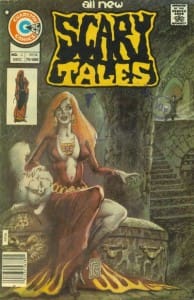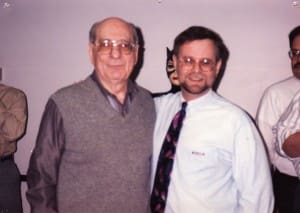 Growing up in the 1960s, I was a diehard DC Comics fan. I was also a fan of Marvel and Charlton and Gold Key and Warren and the handful of other publishers than sharing space on America’s comic book spinner racks, but it was DC Comics that stood front and center in my heart. DC’s comics were slick and beautifully produced and, more importantly, they were home to the world’s greatest superheroes: Superman, Batman, Wonder Woman (the only superheroes to survive in their own ongoing titles from the 1940s Golden Age straight through the Comics Wasteland of the 1950s), Aquaman, Green Arrow (who likewise survived the near-death of the superhero genre, albeit as back-up features), the Flash, Green Lantern, the Atom, Adam Strange (just a few of characters which helped jump start the new heroic age of comics that exploded in the 1960s), and many more.
Growing up in the 1960s, I was a diehard DC Comics fan. I was also a fan of Marvel and Charlton and Gold Key and Warren and the handful of other publishers than sharing space on America’s comic book spinner racks, but it was DC Comics that stood front and center in my heart. DC’s comics were slick and beautifully produced and, more importantly, they were home to the world’s greatest superheroes: Superman, Batman, Wonder Woman (the only superheroes to survive in their own ongoing titles from the 1940s Golden Age straight through the Comics Wasteland of the 1950s), Aquaman, Green Arrow (who likewise survived the near-death of the superhero genre, albeit as back-up features), the Flash, Green Lantern, the Atom, Adam Strange (just a few of characters which helped jump start the new heroic age of comics that exploded in the 1960s), and many more.
I don’t recall exactly when I realized that there were, somewhere, people who actually produced the comic books that I devoured by the dozens off the rack at the cigar store on Ralph Avenue or the candy store on Remsen Avenue and Avenue B, but by 1964 or so, I was creating my own comic book stories, written and drawn (badly in both instances) on lined loose-leaf paper and in composition books. I suppose it was Marvel Comics, which featured creator credits on page one of every story, that did the trick. Stan Lee, Jack Kirby, Steve Ditko, Don Heck, Dick Ayers, Sam Rosen et al were credited with different aspects of the creation of those stories. Writer. Artist. Inker. Letterer. While math was never my forte, it was easy enough here to put two and two together and see that making comic books was an actual job.
And I wanted it!
I knew I’d never make it as an artist, but coming up with stories was easy for me. I didn’t show these stories to anyone because I was fairly certain they sucked, but I knew I could do it. By the late 1960s I had also discovered fellow comic book fans and comics fandom. By 1971, along with friends Paul Levitz and Steve Gilary, I was about as deeply immersed in said fandom as one could get and, thanks to the exposure afforded me by the fanzines we published (The Comic Reader and Etcetera), more determined than ever to make the jump from fan to professional.
In 1975 that determination lead me to meeting the first of three editors to whom I owe an immeasurable debt of gratitude. Another of those three, DC’s Julius Schwartz, had already left his mark on me through the insanely great comic books he oversaw there, including the aforementioned superhero age jumpstarting Flash, Green Lantern, Atom, Adam Strange, and other titles he edited. I don’t think it’s an overstatement to say (and even if it is, it’s my opinion anyway) that Julie was probably the most influential editor in the history of the medium. His (at the time) thinking man’s approach to comic book story telling was the foundation upon which later editors like Stan Lee were able to build an entirely new direction for comics.
But before I met Julie, there was Wally Green. In late 1974, after about a year of ghostwriting for friends who had proceeded me into the business, I screwed up my courage and sent off a batch of ghost story plots and a couple of sample scripts to Gold Key Comics, which at the time was publishing such anthology titles as The Twilight Zone and Boris Karloff Tales of Mystery. Wally got in touch with me and invited me up to Gold Key’s New York offices to discuss my submissions (I have a vague recollection of them being on Park or Lexington Avenue, but that’s neither here nor there). Like their location, my memory of the exact conversation is lost in the haze of the last forty years, but Wally sat me down and, story idea by story idea, went through my submissions and explained exactly why he wasn’t going to buy them. He explained that there was nothing inherently wrong with any of them, just why they weren’t right for the Gold Key books he edited, and he hoped I would continue submitting stories to him.
Wherever those offices were located, I left them walking on air. I was two blocks away before I realized that I had been soundly rejected…but it didn’t matter. Wally Green, a professional comic book editor, had treated me, a 19-year old wannabe, with the same professional courtesy he would extend to his own stable of writers. And for me, as insecure about my nascent abilities as it got, it was a gift from the Muses. Instead of the standard rejection form letter that I’m sure most editors would have sent out and which would, likely, have left me crushed, I had been given an open, honest, face-to-face critique that was, far from being dismissive, an affirmation and encouragement of whatever talent I showed.
Thank you, Wally Green! You were, and remain in my heart, a mensch among men! (Later, Wally did work, briefly, at DC, at which point I was able to tell him the above story and thank him in person for his warmth and encouragement. His response was to be baffled that an editor would treat any talent, professional or, especially, wannabe, any other way.)
 Wally’s encouragement gave me the courage to take those stories rejected by Gold Key and send them off to the editors of Charlton Comics in Derby Connecticut. Not too much later I received a letter from Assistant Managing Editor Nicola Cuti: “We’re accepting “DISTRESS” (See enclosed billing instructions)…The synopses sound good so do them up in script form and we’ll probably take them.”
Wally’s encouragement gave me the courage to take those stories rejected by Gold Key and send them off to the editors of Charlton Comics in Derby Connecticut. Not too much later I received a letter from Assistant Managing Editor Nicola Cuti: “We’re accepting “DISTRESS” (See enclosed billing instructions)…The synopses sound good so do them up in script form and we’ll probably take them.”
And, just like that, I was a comic book professional. Charlton paid $5 a page for scripts in those days and the $25 I received for that first story (which was drawn by another relative newcomer named Mike Zeck and appeared in Scary Tales #3 in late 1975) remains the sweetest money I’ve ever received. And, as instructed, I wrote up the other synopses and Nick did take them, and, just like Wally’s professional treatment of me gave me the courage to keep going, Nick’s acceptance of my writing was affirmation that I could in fact make it in comics.
That was validated a few months later when I wrote my first story for DC Comics, a “World of Krypton” back-up for the Denny O’Neil edited Superman Family, my foot in the door at the Crown Jewel (in my eyes anyway) of comic book publishers. That first assignment lead to others, introduction pages for House of Mystery, short stories for anthology titles, an ongoing “Nightwing and Flamebird” back-up, a stint on Aquaman, the New Doom Patrol and, before I knew it, an actual career as a comic book writer.
But…no matter what I wrote, there was still a part of me that wouldn’t believe I had made it until I cracked the hardest and most prestigious nut in the joint: the editorial office of Julius Schwartz. That opportunity finally came by way of a backdoor opening thanks to DC’s licensing of a new toy line from Mattel, “He-Man and the Masters of the Universe.” Editor Dave Manak had, for reasons I don’t recall, asked me to write the MOTU tie-in comic, which consisted of a three issue miniseries, a 16-page insert that ran in one of the company’s advertising groups, and an issue of the Superman team-up title, DC Comics Presents. DCCP was one of the Superman line of books then edited by Julie, but for this one issue he stepped aside to act as “consulting editor” while Dave took care of the bulk of the editorial work.

I guess I didn’t screw up my handling of Superman too bad, because the next thing I knew, Julie was in my face, growling, “You wanna write an issue of DC Comics Presents for me?”
Uhhh. Yeah.
For the next three or four years, until he gave up the Superman franchise with the coming of Crisis on Infinite Earths in 1985, I found myself a Schwartz office regular, writing dozens of issues of Superman, Action Comics, DC Comics Presents, Superboy, Supergirl, and the daily Superman syndicated newspaper strip. Being one of “Julie’s boys” was, for this fan of 1960s era DC, the ultimate validation. Getting to know this legendary curmudgeon (it was all an act!) was just the icing on the cake.
So thank you, Wally, Nick, and Julie. I’m fairly certain if not for you three gentlemen, I would have had a fine career as a high school English teacher, a valid and worthy profession to be sure…but imagine all the subsequent adventures I would have missed.

I love reading about your life’s story, Paul! The inside scoop is always entertaining! Thanks for writing this!